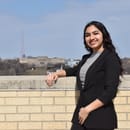If you’re coming into this article confused on what BIPOC is, then I have an article for you! Check out my previous article that explains what BIPOC is and the importance of using the term before continuing to read this one.
It’s important that we establish that climate change is an intersectional issue, meaning that climate change intersects with other issues like poverty, sexism and so on. Full stop. Climate change affects different groups of people, marginalized groups, disproportionately compared to groups that are in power. Full stop. Now that these two things have been established, we can delve deeper into why it’s important that marginalized groups who are disproportionately affected are the ones whose voices and experiences are centered, compared to groups in power.
Climate change is very real and it’s not some far off problem. It’s affecting people right here and right now. A lot of the communities who are vulnerable to climate change are unfortunately the ones that have been underrepresented or not listened to in the movement. Now this is not to say that anyone should be barred from participating in the movement to fight climate change — anyone can be an advocate for fighting climate change. But it’s important to note how much of which voices we listen to.

Besides the obvious reasons, you may be wondering why it’s so important that marginalized people and people disproportionately affected by climate change are put at the forefront of the discussion. Eco-facsism, a subculture of facsism, is on the rise again. Eco-facsism is best described as a set of ideologies that uses the ecological, or climate, crisis as a means to scapegoat marginalized groups. It is the combination of white supremacy and environmentalism and it actually became popular in WWII by Hitler. Blaming climate change on people who have contributed the least and are more likely to be affected isn’t productive or meaningful and has the capability of spiraling into something worse.

It’s especially important that during a crisis such as this pandemic, we as individuals don’t fall into this harmful rhetoric. This ideology has been used to justify policies, like eugenics and the brutal suppression of migrants, that further harm already marginalized groups. This is why it’s important to hand the microphone to BIPOC and other marginalized groups so that we have the opportunity to bring an intersectional perspective to the climate crisis. Just a reminder, according to National Geographic, Indigenous people protect about 80% of the biodiversity of the Earth while only making up about 5% of the population of the world.
When you look at the representation of Indigenous people or other marginalized groups, it is another example of a group of people who are being subjected to the brutality of our economic system and climate change that’s disproportionate. Now, don’t get me wrong, I adore Greta Thunberg and all that she has done for the movement. But there are so many other voices and faces we should also be looking at. I encourage you to look at climate justice activists like Isra Hirsi, Helena Gualinga, Vanessa Nakate and so many others. I know that the media has a habit of picking and choosing who they portray, often leaving important groups out, but as individuals, we can make the difference by making the effort to listen to those who are being ignored.


